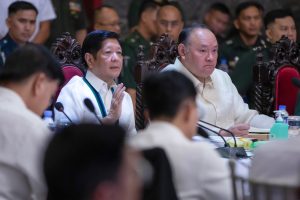The Philippines armed forces will work to ensure that the country has “unimpeded” access to the natural resources in its portions of the South China Sea, Defense Secretary Gilberto Teodoro said earlier this week, in announcing a shift to a new and more robust defense policy.
In a policy speech at the Manila Overseas Press Club on Tuesday night, the transcript of which was released yesterday, Teodoro detailed the military’s new “comprehensive archipelagic defense concept,” which is aimed at ensuring that the country benefits from the natural resources that are to be found in its exclusive economic zone (EEZ).
“We are evolving into a defense concept which projects our power into areas where we must, by constitutional fiat and duty, protect and preserve our resources,” Teodoro said, according to the Philippine News Agency.
The implementation of the strategy will “guarantee as much as possible … unimpeded and peaceful exploration and exploitation of all natural resources” within the country’s EEZ. This access would apply to Philippine nationals, corporations, and others authorized by the Philippine government, he said.
Teodoro’s announcement is the clearest sign yet in the development of a more defiant and robust Philippine defense policy – one that is geared more toward defending the country from external threats than putting down the internal rebellions that have plagued the country since its independence in 1946.
Unsurprisingly, it comes after a year of growing tension with China in the South China Sea, where China’s expansive “nine-dash line” claim lops off large portions of the Philippines’ EEZ.
Much of the recent tension has involved the Philippine-occupied Second Thomas Shoal in the Spratly Islands. Last year, Beijing imposed a loose blockade of the submerged feature. This has resulted in a number of dangerous confrontations, including one in October in which Chinese vessels collided with a Philippine navy vessel and a ship seeking to resupply troops stationed aboard a warship grounded on the shoal. Chinese vessels have also used high-powered water cannons and a military-grade laser to drive away Philippine supply ships.
Manila’s plans to drill for oil and natural gas on Reed Bank, northeast of the Spratly Islands, have been hampered for years by the long-running dispute with China. In 2014, the Philippine government suspended exploration at Reed Bank due to the growing maritime tensions. The year before, it brought escalating disputes with Beijing in the South China Sea to international arbitration. The ban on exploration activities was lifted in 2020.
The growing offshore tensions have tanked relations between Beijing and Manila and prompted a rapid strategic convergence between the Philippines and its existing partners, particularly the United States and Japan. Agreements with Canada and Vietnam, another important South China Sea claimant, are also in the works, according to recent reports.
In his speech to the Manila Overseas Press Club, Teodoro suggested that this shift would continue. He said that the Philippines will “increase the tempo” of activities with allies and major partners, including in the South China Sea, and “exercise these partnerships to the full.”
Responding to a question about China’s recent pressure campaign in the South China Sea, Teodoro said that “illegal encroachment by one country on us and that cannot be justified by a big power play or big power competition.”
He added that Beijing’s claim that the country is being party to a superpower rivalry is being used as a “deflection mechanism” to hide the real intention of the occupation of “almost all if not all of the South China Sea.”

































